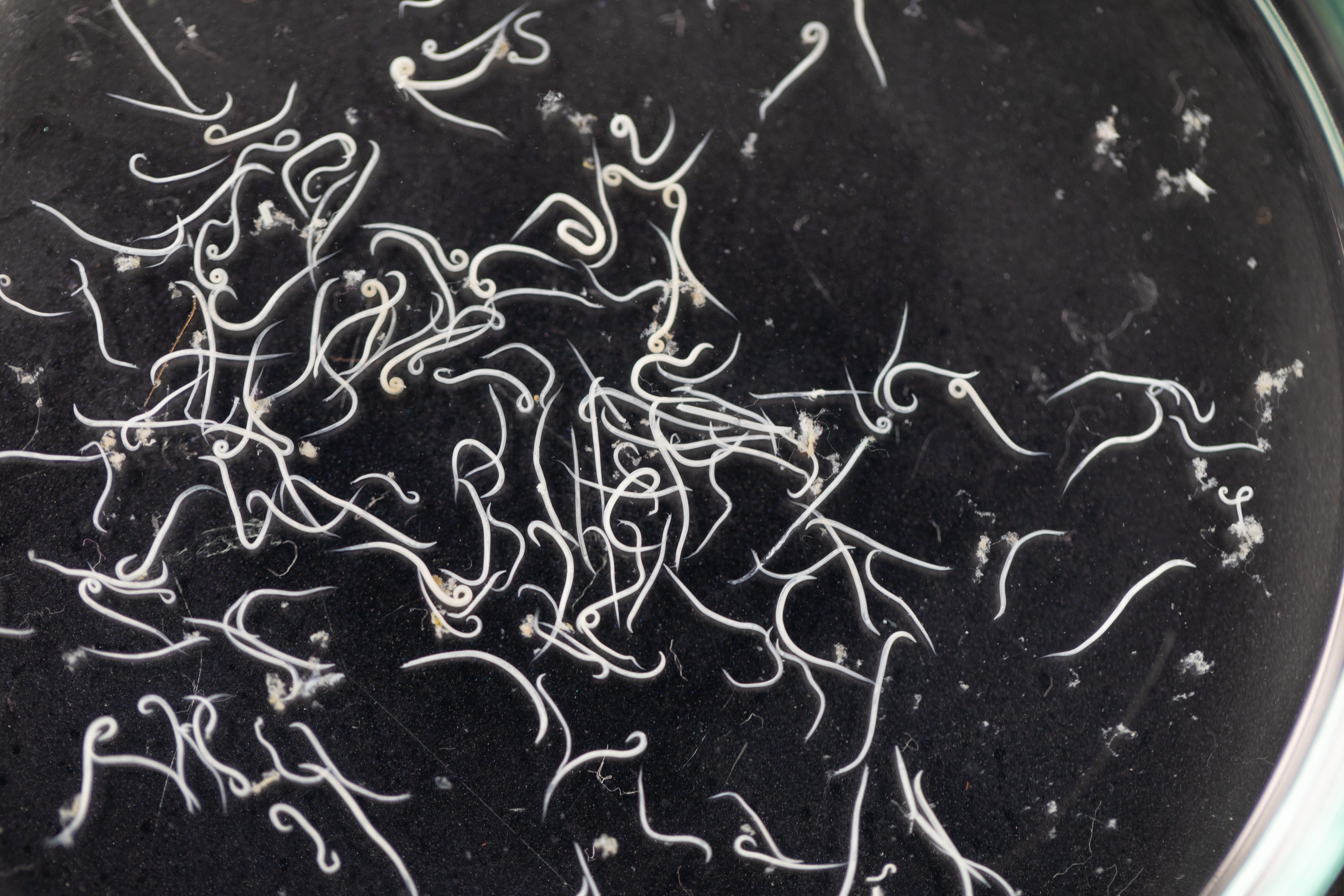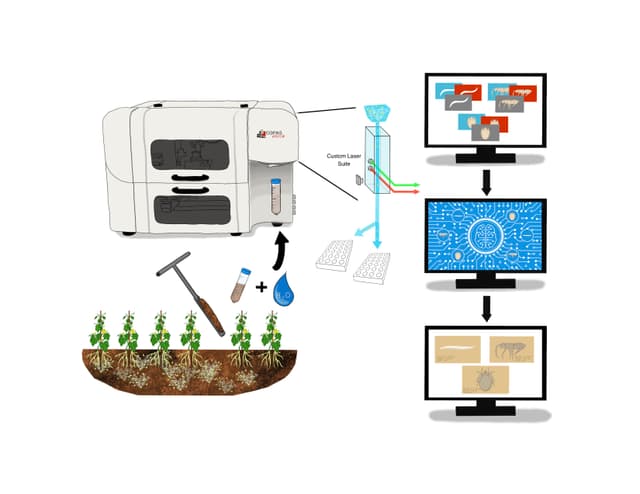
NEMA Lab
Natural Enemy Management and Applications
NEMA
Current Projects
Invertebrate Management | Soil Biodiversity and Conservation
Smart SOD
The NEMA Lab is working with the California Institute for Biodiversity and collaborators in Europe on developing new capabilities for detecting, isolating, and quantifying organisms is the soil and in marine benthic communities. We use the Smart Soil Organism Detector to extract organisms directly from their substrate, separate them using flow cytometry, then identify and sort them for further study.
Organism Extraction and Sorting
The Smart SOD can extract organisms directly from substrate efficiently then sort them into well plates.
Machine Learning
Artificial intelligence and machine learning algorithms are used to identify organisms processed by Smart SOD.
Collaboration
NEMA is working with collaborators in California to quantify soil biodiversity and collaborators in Europe to understand diversity in benthic communities and the influence of microplastics.

Community Engagement
Insects Everywhere
Insects Everywhere is a Burroughs Wellcome Funded program working to close the STEM achievement gap for Migrant Children in western North Carolina through an annual summer camp program, school-year field trips, and roundtable discussions that engage students in STEM concepts through the lens of insects, expose students to academic and career opportunities in STEM, and prepare students to meet the challenges facing them as they pursue higher education and STEM careers.
STEM Inquiry & Problem Solving
Insects Everywhere develops students’ scientific inquiry, critical thinking, and problem-solving skills through individual and team-based, experiential STEM activities.
Training in Technology
Insects Everywhere introduces students to cutting edge technology, scientific equipment, and instrumentation.
Preparing Students for the Future
Facilitate college and STEM career readiness events in which students and their families are provided with key information to enable student success
Preparing Students for the Future
Facilitate college and STEM career readiness events in which students and their families are provided with key information to enable student success

Invertebrate Management | Soil Biodiversity and Conservation
The Lesser of Two Weevils
Through recent hybridization efforts, blight resistant chestnuts are being planted across the eastern US. Accompanying this rise in chestnut trees is a resurgence in rapidly spreading pest: The Lesser Chestnut Weevil ( Curculio sayi ). NEMA Lab is working with The American Chestnut Foundation to understand the presence of this weevil on chestnut hybrids and understand how the new chestnut hybrids influence other insect communities as well.
Populations are Increasing
Populations of the Lesser Chestnut weevil can incease incredibly rapidly reaching 100% infestation in as little as two years potentially ruining harvests.
NEMA Lab is Developing Management for the Lesser Chestnut Weevil
At NEMA lab we are developing monitoring and biological control based techniques to control the Lesser Chestnut Weevil.
Interested? Read More...
See our recent publications on Monitoring and Biological Control of the Lesser Chestnut Weevil.

Community Engagement
All About Bugs
The NEMA Lab works with local schools and community organizations to bring STEM Education to K-12 students through the lens of insects. Using a variety of hands-on activities that engage all the senses, K-12 students engage with the fascinating world of insects while learning about ecology and evolution.
STEM Education Using Insects
K-12 students learn about concepts like ecology and evolution through hands-on activites with insects.
Student Led
All About Bugs is led and developed by UNC Asheville Undergraduates who are passionate about bugs and interested in pursuing careers in education.
Engaging Students across Western North Carolina
Working with community partners, we have engaged hundreds of students in All About Bugs events.

Invertebrate Management
Pollinators
The Bee Hotel, Pollinator Garden, and the Butterfly Garden at University of North Carolina at Asheville serve as a unique resource for both the university and the community to learn about the importance of insects and the interactions between them and the environment. Pollinating insects promote plant diversity, increase resilience and stability of ecosystems, and maintain reproductive success of a majority of flowering plants. The NEMA Lab works with native pollinators to improve their management.
Plant Pollinator Interactions
The NEMA lab is working to understand how pollinators interact with native plants in order to improve conservation efforts.
Native Pollinator Management
The NEMA lab is working with Bee Hotels to understand how different management practices can improve pollinator health.

Soil Biodiversity and Conservation
Burn Area Impacts on Arthropod Community
Controlled burns are a part of management strategies for forest management. NEMA Lab is exploring how controlled burns affect aboveground and belowground invertebrate diversity.
Diversity increases with increasing time since burn.
Diversity levels begin to normalize about 10 years since burn.
Management Strategies
NEMA Lab research suggests that periodicity of burns is important for maintaing levels of biodiversity and that 10 years may be an ideal.

Invertebrate Management | Soil Biodiversity and Conservation
Hemlock
The eastern hemlock (Tsuga canadensis), is a prominent and long-lived member of appalachian forests. This tree can be heavily damaged by a small aphid-like insect the Hemlock Woolly Adelgid (Adelges tsugae). Conservation efforts focused on protecting Hemlock trees often utilize systemic pesticides. The effect of these pesticides on the surrounding ecosystem is unknown. The NEMA Lab is investigating how these systemic pesticides impact soil communities in surrounding hemlock forests.
Soil Biodiversity
The NEMA lab is exploring how pesticide treatments impact soil biodiversity in Hemlock forests.

Invertebrate Management | Soil Biodiversity and Conservation
Nematode Rearing and Collection
Entomopathogenic nematodes (EPNs) are members of soil communities that play an essential role as biological control agents. Two major challenges to understanding and exploring EPNs are the difficulty in extracting from soil and the multiplication in the lab to be used for further research or biological control. Traditional methods of extraction have low recovery rates, while the use of past multiplication methods has resulted in bacterial and fungal contamination. We designed a new instrument that can be used for both extraction and multiplication.
Extraction
Our design improves extraction efficiencies of nematodes from the soil compared to Baermann Funnel extractions.
Rearing
Our design improves the numbers of nematodes emerging from insect hosts.

Invertebrate Management
Nematode Behavior
A variety of environmental factors can disrupt biotic interactions between plants, insects and soil microorganisms with consequences for agricultural management and production. Behavioral responses to these compounds may likewise be dependent on varying soil conditions which are influenced by a changing climate. To determine how changing environmental conditions may affect VOC-mediated biotic interactions, we used a belowground system where entomopathogenic nematodes (EPNs) - tiny roundworm parasitoids of soil-borne insects - respond to VOCs by moving through the soil pore matrix. We assessed the response of these nematodes to VOCs under three moisture regimes to determine whether drier conditions or inundated conditions may influence the response behavior of these nematodes.
